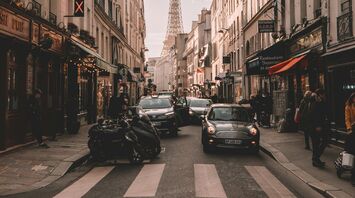Paris Embraces Electric Vintage on Wheels

Paris, known for its ambitious environmental goals, is taking significant strides towards a greener future by embracing electric vehicles (EVs). The city plans to ban fossil fuel cars by 2030, paving the way for an electrified capital filled with EVs, including a remarkably quiet 1955 Renault 4L.
Our journey begins in a white-and-blue Renault, a classic model that, thanks to modern engineering, hums through the streets of Paris without the usual racket of its vintage counterparts. With the radio playing softly, it's a serene ride through the 8th arrondissement, an area known for its quintessentially Parisian architecture. The vehicle, retrofitted with a powerful battery, surprises with its agility and speed, handling the cobbled streets with ease.
Electric vehicles are becoming increasingly commonplace in Paris, supported by initiatives like the once-offered €100 per month leasing scheme that saw an overwhelming response. The city's infrastructure is adapting too, with more charging stations and even an electrified motorway that charges vehicles as they drive.
For Renaud Garza, our driver and guide, transitioning to electric tours was a natural evolution. His company, 4 Roues Sous 1 Parapluie, traditionally known for tours in petrol Citroën 2CVs, now includes electric options like our Renault 4L. These eco-friendly alternatives offer a new way to experience the city's landmarks, from the bustling Champs-Élysées to the majestic Arc de Triomphe.
As we approach the iconic Arc de Triomphe, Renaud navigates what he calls "the most dangerous place in Paris," the star-shaped roundabout that sees continuous flows of traffic. It’s a thrilling ride around this chaotic yet historical roundabout, known as the Etoile, before we continue past lively cafes and across a bridge over the Seine.
Our next stop is the Eiffel Tower, originally constructed for the 1889 World’s Fair and initially disliked by Parisians for its stark industrial appearance. Today, it stands as a beloved symbol of French ingenuity and elegance, soon to be repainted gold for the upcoming Olympics, highlighting its historic and aesthetic significance.
Renaud’s commentary not only enriches our understanding of Paris’s landmarks but also reflects a deep-seated national pride and a desire to impress on the global stage, especially with the upcoming Olympic Games.
Paris is transforming its narrative from a city known for its historical charm to one that also pioneers in sustainable urban mobility. By embracing electric vehicles, Paris offers both residents and visitors alike a new, environmentally friendly way to explore its beauty, without sacrificing the allure of its past.



















